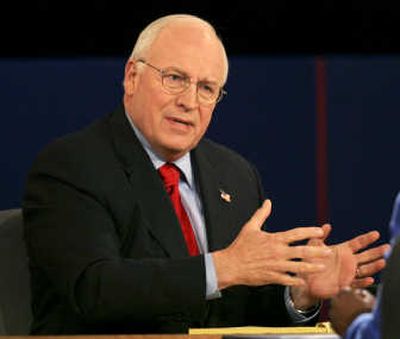WSU turns down VP debate

Washington State University’s push to host a national political debate in Spokane wasn’t snuffed out Monday by a search committee. The snub was self-inflicted.
Michael Tate, vice president of equity and diversity at WSU, announced Monday that Spokane had been passed over in its bid to host one of three presidential debates next fall.
But he failed to mention that WSU had been offered the chance to entertain the only vice presidential debate of the 2008 election, which attracted more than 43 million viewers in 2004 when Dick Cheney squared off against John Edwards.
“We had an offer to host the vice presidential debate,” Tate confirmed, “but we decided, with the focus we had right from the beginning of getting one of the three presidential debates, that we were just not in the position to accept the vice presidential debate.”
While some civic leaders said Tate made the right call, others called it “a blunder” and “a mistake.”
And officials in St. Louis, which got the vice presidential debate after WSU turned it down, were elated to receive the national attention by default.
“Spokane turned it down, great. St. Louis will take that business,” said Donna Andrews, public relations director of the St. Louis Convention and Visitors Commission.
WSU was one of 19 universities studied by the Commission on Presidential Debates as possible sites for three presidential debates and one vice presidential debate scheduled for next fall.
On Monday, it awarded the Sept. 26 presidential debate to University of Mississippi; the Oct. 7 debate to Belmont University in Nashville, Tenn.; and the Oct. 15 debate to Hofstra University in Hempstead, N.Y.
The University of Washington in St. Louis, Mo., accepted the Oct. 2 vice presidential debate after WSU turned it down.
Spokane Mayor Dennis Hession said Tuesday he was aware of WSU’s decision and supported the call. He pointed out that each host city would have had to raise more than $1 million in private funds to defray the cost of the event.
“It was a great idea. We loved it,” Hession said. “It was a very important next step for the maturation for Spokane.”
But the events are costly to support, he said.
“Without the aura of a presidential debate it is that much more challenging,” Hession said.
Tom Keefe, a former Spokane County Democratic Chairman, called Tate’s decision a “blunder.”
“I think beginning with the Clinton-Gore relationship, and clearly with the Bush-Cheney relationship … the vice president in the modern term is an important player,” Keefe said. “For Washington State University to turn that down tends to confirm Washington State University’s own self image as a second-rate place.”
Curt Fackler, Spokane County Republican Chairman, called it “the wrong decision.”
“Anytime you can be on the national stage and show off your area, that’s a good opportunity,” Fackler said.
Harry Sladich, director of the Spokane Area Convention and Visitors Bureau, worked with Tate to research the potential impacts and benefits of Spokane hosting a debate. He learned from a reporter Tuesday of WSU’s decision.
“If the vice presidential debate was an option, I wasn’t aware of it and nothing we did was geared for that,” Sladich said. “It wasn’t even on our radar screen.”
But, Sladich said, “I think (WSU officials) made the right decision because we don’t have a stitch of data on that. We don’t know what traps could have been there.”
Sladich said his organization focused its research on the impact the presidential debates. It never talked to city officials who previously hosted vice presidential debates.
“I’ll bet the cities who hosted the vice presidential debates didn’t have near the impact,” he said. “We would rather save ourselves for another day when we can get a presidential debate.”
According to the debates commission website, the three presidential debates in 2004 between George W. Bush and John Kerry attracted 62.4 million viewers, 46.7 million viewers, and 51.1 million viewers. In comparison, the single vice presidential debate in 2004 attracted 43.5 million viewers.
A member of Sladich’s own staff indicated seven months ago that the bureau was considering the chance of landing the vice presidential debate. Tim Rhodes, a convention sales manager for the bureau who worked with WSU on the application, told The Spokesman-Review in April that Spokane has a track record of success hosting such events.
“It doesn’t get much bigger than a presidential debate or a vice presidential debate,” Rhodes said at the time. “I don’t think we will ever host a Super bowl, so next to that, this is big.”
Tate said selling the vice presidential debate would have been a tough sell to business partners expecting the more prestigious presidential debate.
“Having either one is a real honor, but our partnerships and sponsors were all focused on the presidential debate,” he said Tuesday.
But those comments appear to contradict a statement Tate gave The Spokesman-Review last spring, in the same article in which Rhodes was quoted. “We would just be honored to have any one of them,” Tate said at the time
Andrews, the St. Louis booster, said she was surprised Spokane turned down the event.
“We don’t know the factors that went into that,” she said. “Anytime St. Louis is put before national and international viewership, it’s great.”
Sladich wasn’t moved when informed of Andrews’ response.
“We certainly don’t have the corporate deep pockets that they have,” he said. “We have to make sure we can deliver.”
Sladich acknowledged that many residents may question the decision. “But I think they would be far more disappointed to try to pull it off and it didn’t go well,” he said.